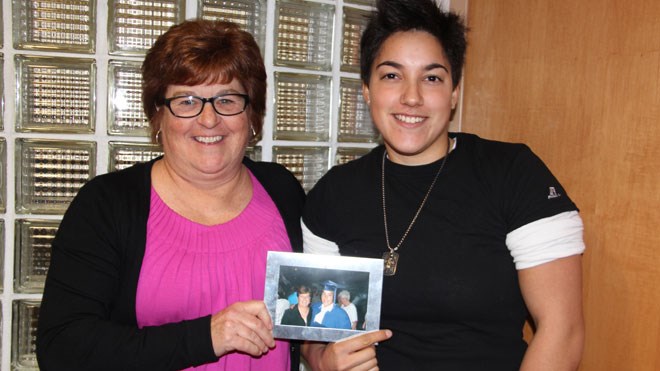Kim Taylor-Horeck's office features a shelf of photos of herself posing with grinning students in graduation gowns.
The attendance counsellor at the Sudbury Catholic District School Board, who is responsible for promoting regular school attendance, refers to it as her “hero shelf.”
Once referred to as truancy officers, and tasked with ensuring children were going to school as the law dictates, modern attendance counsellors are more concerned with helping students achieve than in punishing them for playing hooky.
All four boards employ attendance counsellors.
"Heroes" is what she calls former clients who have earned high school diplomas. She said she always cries at their graduations. “It's like it's one of my own. It's the ultimate when they graduate. That's what you want them to do.”
One of the people featured on Taylor-Horeck's hero shelf is 23-year-old Kendell Cochrane, who graduated from Marymount Academy in 2009.

Sudbury Catholic District School Board attendance counsellor Kim Taylor-Horeck (left) and former client Kendell Cochrane show off the picture taken of the two four years ago, at Kendell's graduation. Photo by Heidi Ulrichsen.
While she may be happy now, working in the stockroom at a retail outlet with dreams of becoming an early childhood educator, when she was in Grade 9, Cochrane went through a period of depression.
“I was in school, but I wasn't there,” she said. “You know what I mean? My mind was other places. I had no focus, I had no drive.”
Taylor-Horeck somehow “tuned in” to Cochrane's troubles, and offered her counselling.
“During the times where it was rough, she didn't step back,” she said. “She didn't judge me, which is something I really needed. She always made me feel like I was normal, like I was accepted, like I was loved, and that was awesome.”
Success stories such as Cochrane's don't come easily though, said Taylor-Horeck, Sudbury Catholic's sole attendance counsellor.
Of the 163 students referred to her during the 2012-2013 school year, she's closed 86 files, but still had 77 active files at the end of June.
Closing a file could mean a number of things, including students turning 18 and no longer high-school age, being incarcerated or transferring to another board.
But 23 of these students are actually now attending school regularly.
And then there are those who graduate.
“My theory is, if I can have one graduate every school year, then I've done my job,” said Taylor-Horeck, who has been an attendance counsellor with Sudbury Catholic since 1993.
She serves students between the ages of six and 18 — the ages kids must, by law, be in school. Her clients are usually fairly evenly split between elementary and secondary students. In 2012-2013, she served 69 secondary students and 94 elementary students.
Taylor-Horeck normally intervenes if a student has been absent 10 or more times without an adequate explanation, if absence begins to show a regular pattern (i.e. Mondays and Fridays), or if absence begins to affect a student's progress.
Students can be referred to her by school officials, parents or even concerned members of the public.
To reach out to her clients, Taylor-Horeck often visits them at home, but also finds herself visiting malls, coffee shops, libraries, bowling alleys, or even the soup kitchen, in the case of those who have fallen on hard times.
As a last resort, Taylor-Horeck can charge students with the provincial offence of refusing to attend school, but said it's been a long time since she's done that.
Unlike the truancy officer of yesteryear, she doesn't use typically a heavy-handed approach to compel hooky-playing students to go back to school.
“I don't go in and say 'Why are you here? You should be in school,' because most of the time, you won't get anywhere doing that, playing hardball,” Taylor-Horeck said.
Instead, Taylor-Horeck, who has a bachelor's degree in psychology, listens to their problems, offers them counselling herself if appropriate, or refers them to outside agencies if it's not something she can deal with herself.
“You have to have a whole bag of tricks,” she said. “Depending on the certain situation a student is in, you have to use different methods to get them back.”
When students miss a lot of class, the stakes are high, Taylor-Horeck said.
At the high school level, frequent absenteeism puts students at risk of having to repeat their academic year, while elementary students miss out on basic literacy and numeracy skills.
“I would say for most students, the farther behind you get, the harder it is,” she said. “When we do work through the issues and they do have to go back to school, they realize they're far behind, and it's frustrating.”
As someone once at risk of dropping out of high school herself, Cochrane advises students in similar situations not to be afraid to trust people such as Taylor-Horeck. She also wants them to realize what's at stake.
“It's easy to get lost in the feeling that either nobody cares or that school's just something to rebel against,” she said.
“If anything, that's not one of the things to take for granted, because really, if you look at employers, who hires anybody that doesn't have a high school diploma nowadays?”
Reasons why students don't attend school
-Academic issues such as learning disabilities
-Social issues such as domestic violence or conflict with the law
-Individual issues such as psychiatric problems or divorce
-Situational issues such as illness
-Structural issues such as lack of supervision or students living independently
